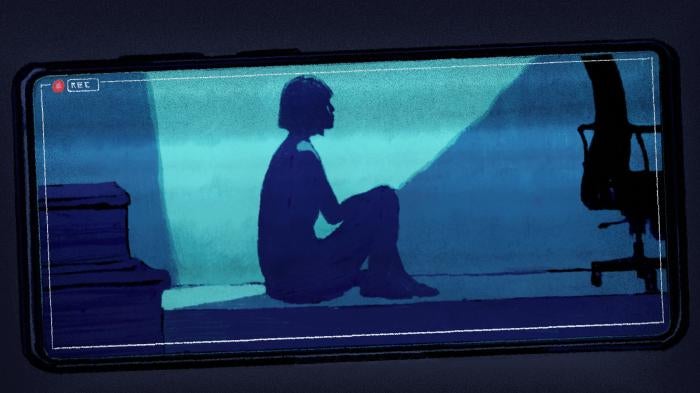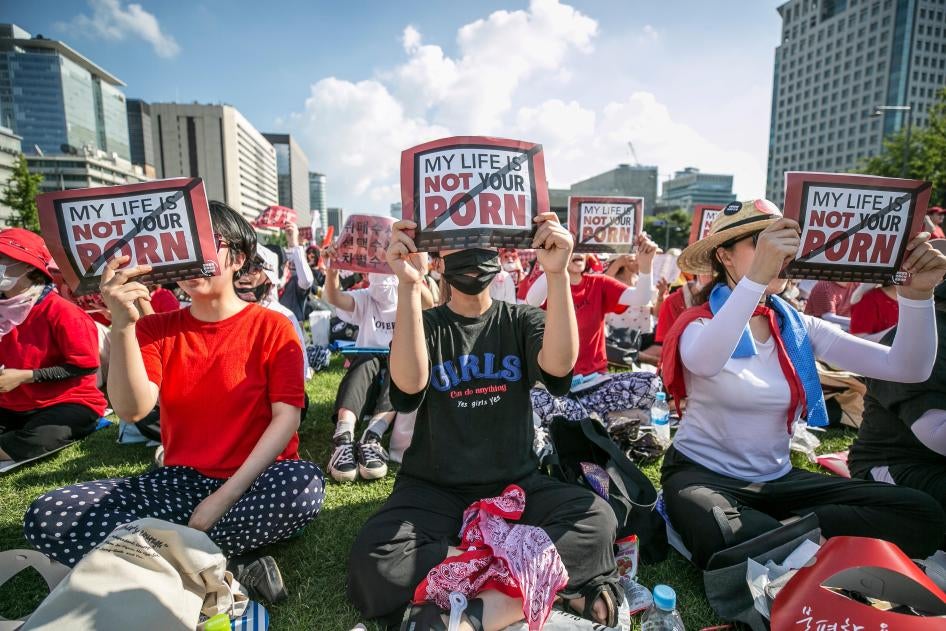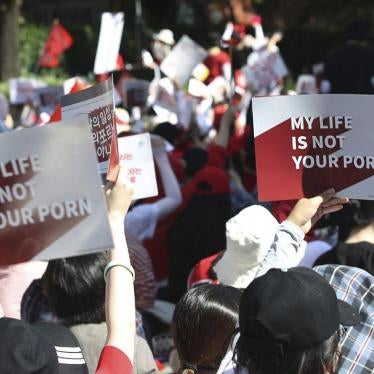(Seoul) – Widespread internet posting in South Korea of sexual images of women and girls without their consent is having a devastating impact on the victims, Human Rights Watch said today. The government should be doing more to prevent and respond to these digital sex crimes.
The 96-page report, “‘My Life is Not Your Porn’: Digital Sex Crimes in South Korea” found that despite legal reforms in South Korea, women and girls targeted in digital sex crimes – acts of online and tech-enabled gender-based violence – face significant difficulty in pursuing criminal cases and civil remedies, in part due to entrenched gender inequity. Digital sex crimes are crimes involving digital images – almost always of women and girls – that are captured without the victim’s consent, shared nonconsensually, or sometimes manipulated or faked.
“Officials in the criminal legal system – most of whom are men – often seem to simply not understand, or not accept, that these are very serious crimes,” said Heather Barr, interim co-director of women’s rights at Human Rights Watch and author of the report. “Anyone who has ever viewed one of these nonconsensual images could have taken a screen shot and can share that screen shot any time, on any website, from which it may spread uncontrollably. Survivors are forced to deal with these crimes for the rest of their lives – with little assistance from the legal system.”
The report is based on 38 interviews, with survivors of digital sex crimes and experts, and an online survey of survivors.
In 2008, fewer than 4 percent of sex crime prosecutions in South Korea involved illegal filming. By 2017 the number of these cases had increased elevenfold, from 585 cases to 6,615, and constituted 20 percent of sex crime prosecutions. Much of the public attention to digital sex crimes was initially driven by use of tiny cameras (“spycams”) to covertly record footage in places like toilets, changing rooms, and hotels, with those placing the cameras sometimes earning money by selling the footage.
The women and girls targeted face major barriers to justice. Police often refuse to accept their complaints and behave in abusive ways, minimizing harm, blaming them, treating images insensitively, and engaging in inappropriate interrogation. When cases move ahead, survivors struggle to obtain information about their cases and to have their voices heard by the court.
In 2019, prosecutors dropped 43.5 percent of sexual digital crimes cases, compared with 27.7 percent of homicide cases and 19 percent of robbery cases. Judges often impose low sentences – in 2020, 79 percent of those convicted of capturing intimate images without consent received a suspended sentence, a fine, or a combination of the two. Fifty-two percent received only a suspended sentence. The problems survivors face in the justice system are exacerbated by a lack of women police, prosecutors, and judges.
Civil remedies such as a court order compelling the guilty party to delete images or pay damages to a victim are not easily available. When a civil claim is brought based on facts that are also the subject of a criminal prosecution, it is common practice to defer the civil action until conclusion of the criminal case. This means survivors cannot seek assistance during the time when it may be most needed.
Survivors are typically too exhausted and traumatized by the end of a criminal trial – and sometimes multiple appeals, over the course of several years – to initiate a new proceeding in civil court, even if the criminal case has established facts that would support such a case. Filing a civil complaint would require victims to indicate their names and addresses, making this information available to the public, including to the person who committed the crime, something few survivors are comfortable doing.
“Digital sex crimes have become so common, and so feared, in South Korea that they are affecting the quality of life of all women and girls,” said Barr. “Women and girls told us they avoided using public toilets and felt anxious about hidden cameras in public and even in their homes. An alarming number of survivors of digital sex crimes said they had considered suicide.”
South Korea’s government and National Assembly have taken some important steps in recent years to reform the law and provide services to people experiencing digital sex crimes – largely in response to mass protests by activists in 2018. But these measures are still inadequate, in part because they have failed to grapple with deep forms of gender inequity that fuel and normalize digital sex crimes. In the 2021 World Economic Forum Global Gender Gap ranking, South Korea ranked 102 out of 156 countries, with the largest gap on economic participation and opportunity of any advanced economy.
South Korean women do four times as much unpaid work as men and face a 32.5 percent gender pay gap. Gender-based violence is widespread – in a 2017 survey of 2,000 South Korean men, nearly 80 percent of respondents admitted to violent acts against an intimate partner – compared with the global estimates that one in three women experience such violence. The national sexual education curriculum, issued in 2015, has been widely criticized for perpetuating harmful gender stereotypes.
“The root cause of digital sex crimes in South Korea is widely accepted harmful views about and conduct toward women and girls that the government urgently needs to address,” Barr said. “The government has tinkered with the law but has not sent a clear and forceful message that women and men are equal, and misogyny is unacceptable.”
Sample Cases from the Report
Park Ji-young (most names are pseudonyms) was looking through her boyfriend’s phone when she saw that it contained photos of women that appeared to have been taken covertly in public – up their skirts, or of their buttocks. She later gained access to his cloud storage where she found 40-50 intimate images that seemed to be of sexual partners, including four of her. She tried to find the other women in the photos, but her now ex-boyfriend threatened her.
She went to the police. But a lawyer assigned to help her repeatedly urged her to drop the case. She found another lawyer but before the case was sent to the prosecutor a detective called, saying if she did not agree to an out-of-court resolution the ex-boyfriend’s lawyer would seek to have her prosecuted for defamation and for accessing the man’s files.
It was 1 a.m. in 2018 and Jieun Choi was trying to sleep when her doorbell began ringing repeatedly. When she answered the door, she found a police officer who informed her that a man had been filming her, through her window, from the roof of a nearby building. The man told police he had been filming her for two weeks. When police obtained a warrant and seized the perpetrator’s electronic equipment, they found he had collected images of seven other women, and Jieun Choi later learned that he had also been charged with the same offense several years earlier. He received a suspended sentence.
Lee Ye-rin’s employer made romantic overtures toward her; he was married, and she was not interested. One day he bought her a clock as a gift. She put the clock in her bedroom, but later found that it was a spycam and that he had been streaming footage for a month and a half. She faced lasting impact from the experience. “What happened took place in my own room – so sometimes, in regular life, in my own room, I feel terrified without reason.” A year later, she continued to take medication prescribed for depression and anxiety.
Sohn Ji-won was 16 when she met someone online through a website that connects people randomly to chat. “I was having hard time, so maybe I needed someone I could depend on,” she said. He demanded sexual images. She sent them, and then regretted it and tried to delete them. He became abusive. She met other men on Telegram, who pressured her into sending intimate photos, promising to delete them immediately – only for her to later find one of the photos posted in a chat group.
Two months after Kang Yu-jin ended a four-year relationship, she began receiving messages from strangers. One sent photos of her posted online, including “my address, the school where I had studied, the name of my job, the address of my job, and a photo of the exterior of the building where I lived.” Her ex confessed and apologized, But the abuse continued and escalated.
The posts – hundreds of them, over several months – appeared on sites including Tumblr, Twitter, Facebook, Torrent, YouTube, Instagram, Naver Blog, Naver Cafe, Daum blog, Daum cafe, and Google photos. One day, two strange men showed up at Kang Yu-jin’s office, drawn by the posts. “There were men who wanted to contact me at the church where my parents attended … and there were men who sent me a message to have sex,” she said. She was forced to quit her job and fled her home permanently.










